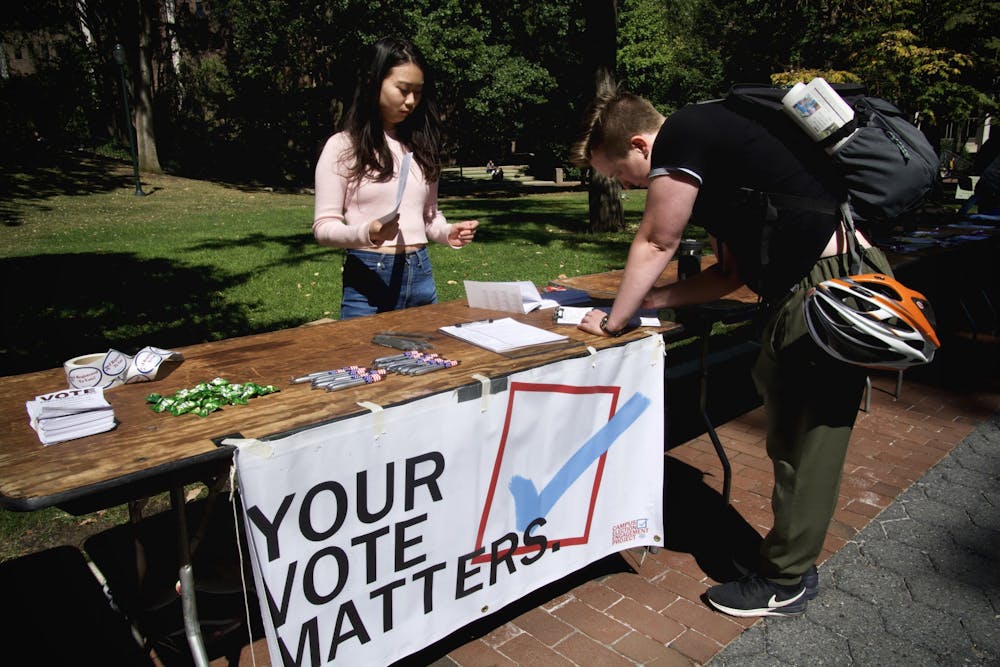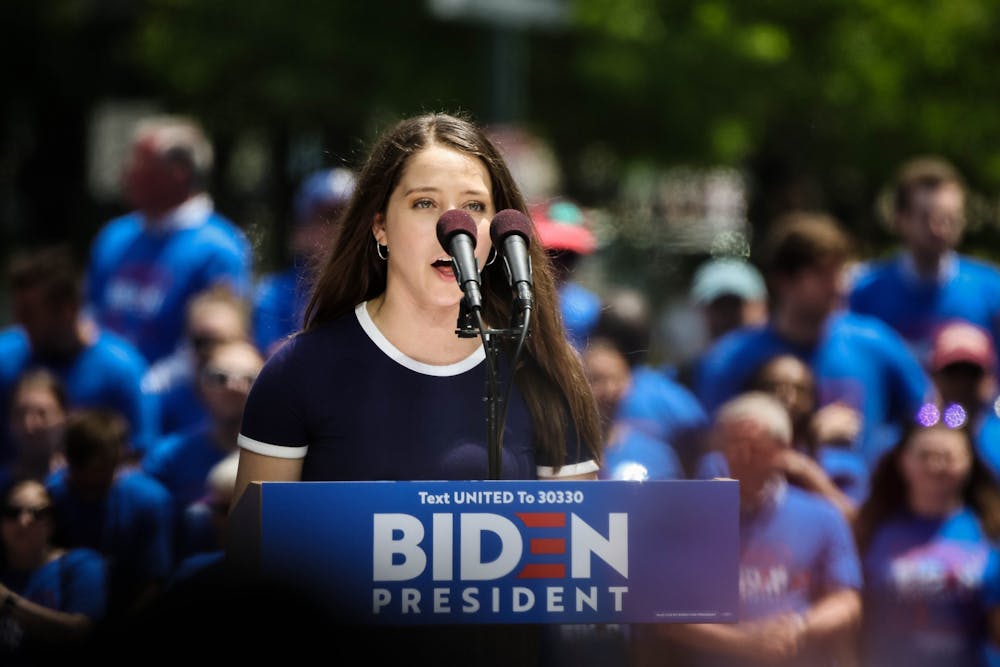
Penn Leads the Vote, a nonpartisan student organization, helping Penn community members register to vote in Sept. 2019.
Credit: Kylie CooperAcross party lines, Penn’s largest political groups are calling on the University to allow students an excused absence from classes on Election Day to encourage political engagement in a historic election.
Penn Democrats, College Republicans, Penn for Biden, and the Wharton Politics & Public Policy Club sent a letter to Provost Wendell Pritchett on Sept. 1 requesting that Penn adjust all classes' attendance accommodations for students seeking to work the polls on Nov. 3.
“It should be easy to vote, it should be a time when we don't have to worry about school but when we can worry about having our voices heard. And I think that right now that is not what is happening,” College junior and Penn for Biden co-chair Cassy Ingersoll, who signed the letter on behalf of the group, said. “I do feel like administration is not doing enough and not really listening to not only the students, but also the faculty who have pushed for just general political engagement.”
Likewise, College Republicans’ Executive Board wrote in an emailed statement to The Daily Pennsylvanian that Penn presently does not do enough to ensure its students, faculty, and staff have the right to participate in democracy and support voter turnout.
“As students in Philadelphia, we have an obligation and a responsibility to ensure that the interests of native Philadelphians as well as the Penn community are relayed to government officials,” College Republicans’ Executive Board wrote in the email.
But Penn will not accommodate the request as the school's Academic Calendar follows the federal holiday schedule and is bound by requirements for class time as set by "regional and state accrediting bodies," Associate Director for Education Jen Canose wrote in an emailed response on Sept. 11 to the student groups. The request to make Election Day an academic holiday had been recently brought up by other students and was considered by the Council of Undergraduate Deans in the spring, Canose also mentioned.
The groups, however, are continuing to move forward with their efforts, and they are contacting individual department heads — particularly in fields such as Political Science and Economics — to ask if they would consider giving students taking classes in those departments election day off. Canose wrote that Penn’s policies on attending class vary by school, program, and instructor.

The student group leaders emphasized that there has been a nationwide push to have younger people volunteer to work at the polls this year due to a scarcity of poll workers amid COVID-19 health risks. The pandemic is causing a shortage of poll workers in Philadelphia, CBS Philly reported, and the average age of typical poll workers in Philadelphia is 60 years old.
College senior and Penn Democrats president Owen Voutsinas-Klose, who led the initiative, cited Penn’s decision to select “Civic Engagement” as the University’s Academic Theme Year for 2020 as an impetus to allow students an excused absence on Election Day. He believes the majority of Penn students have never worked the polls before, but is seeing increased interest this year especially with Philadelphia’s commitment to pay its poll workers $250 for volunteering for the day — an increase from the usual rate of $100.
The city is rushing to find about 3,000 more poll workers until Election Day and has already hired more than 4,000 volunteers, The New York Times reported.
“We think that this would really encourage Penn students because it would show that Penn condones them in helping their community, keeping people safe, and making sure you know the election functions properly,” Voutsinas-Klose said.
Second-year Wharton MBA student Laura Johnsen, who signed the letter as president of Wharton Politics & Public Policy Club, said she is worried about reaching students who may not be as initially politically engaged. Though Johnsen said she has seen a lot of political activism among MBA students, she mentioned the unique challenges of obeying mail-in ballot deadlines and of not being able to host voter registration drives on Locust Walk this fall.
Due to Penn's decision to shut campus in efforts to curb the coronavirus, fewer Penn students this year are eligible to vote in Pennsylvania — a critical swing state with a highly divided electorate. Voutsinas-Klose told the DP that the amount of people voting at Penn precincts may significantly decrease from 2016 and 2018, as most first years remain ineligible to vote in Philadelphia.
Only 50.1% of eligible Penn students voted in the 2016 presidential election according to data collected by the National Study of Learning, Voting, and Engagement.
College junior and Penn Leads The Vote Director Harrison Feinman admitted that Penn is in a “tricky situation” with its policies limiting the number of holidays allotted during an academic year. He strongly recommended that students interested in being poll workers should reach out to their professors as soon as possible and try to get individual permission to move deadlines or miss class.
He said that in the spring semester, the executive committee of Penn’s Faculty Senate unanimously endorsed a slate of positions brought forward by PLTV — one of which included giving students time off to vote on Election Day if they need it.
The Faculty Senate serves as the representative voice for full-time teaching faculty and convenes through an elected Senate Executive Committee and a set of standing committees.
“I have no doubt that most professors would be amenable to working with students if they want to volunteer on Election Day, but in our mind it shouldn't be the burden of individual students to have to approach professors, one by one,” Johnsen said. “We feel like a lack of this policy may discourage volunteering by students and so [are] really hoping that the University recognizes this and changes its policy.”
Ingersoll, Voutsinas-Klose, and Johnsen have each signed up to be a poll worker in Philadelphia this year, and plan to skip any Tuesday classes and other commitments to volunteer. But the four student groups are still seeking institutional recognition of Election Day from Penn in hopes it will encourage stronger voter participation from its students across the country.
“It’s the simplest things, right? [Penn will] spend a ton of money on Penn Leads The Vote, on giving out free food to people to vote, on having these fellowship programs, giving grants to clubs. It's great. Obviously they care about civic engagement,” Voutsinas-Klose said. “But the easiest thing they could do would cost literally no money, and it would just be to at least encourage professors to give the day off.”
The Daily Pennsylvanian is an independent, student-run newspaper. Please consider making a donation to support the coverage that shapes the University. Your generosity ensures a future of strong journalism at Penn.
Donate






